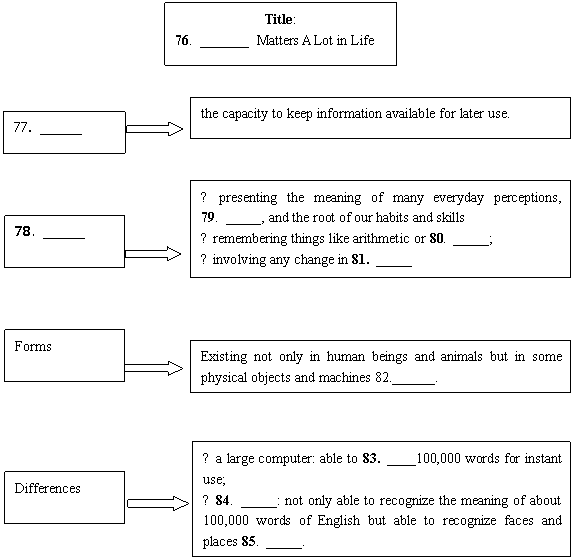题目内容
When a rather dirty, poorly dressed person kneels at your feet and puts out his hands to beg a few coins, do you hurry on, not what to do, or do you feel sad and hurriedly some money? What should our attitude beggars be? There can be no question that the world is full of terribly sad stories. It be terrible to have no idea where our next meal is going to come from. It seems not to give some money to beggars.
, most of the world's great religions order us to be open-hearted and what we have with those less lucky than ourselves. But has the world changed? Maybe what was morally right in the old days, one knew exactly who in the village had suffered misfortune and needed help, is no longer the best idea. Quite a few people will not give to beggars. Let us look at their .
First, some believe that many city beggars dress up to look pitiable and actually make a good from begging. Giving to beggars only encourages this sort of evil.
, there is the worry that the money you give will be spent on beer, wine or drugs.
Thirdly, there is the opinion there is no real excuse for begging. One might be poor, but that is no reason for losing one's sense of and self-dependence.
There is an opinion that the problem should be handled by the government ordinary people. Some people think beggars should go to the local government department and help.
It is hard to come to any final conclusion: there are various and we must them differently. A few coins can save a life in some situations, and even if the money is wasted, that does not take away the moral goodness of the .
1.A. to B. with C. at D. for
2.A. knowing B. expecting C. demanding D. settling
3.A. put away B. hand over C. take in D. get out
4.A. at B. in C. over D. towards
5.A. must B. can C. need D. might
6.A. warm-hearted B. generous C. cruel D. considerate
7.A. Strangely B. Honestly C. Certainly D. Surprisingly
8.A. give B. donate C. share D. contribute
9.A. why B. when C. what D. how
10.A. arguments B. quarrels C. sayings D. talks
11.A. on show B. on purpose C. for fun D. by accident
12.A. money B. comfort C. living D. decision
13.A. Secondly B. Surely C. Possibly D. Then
14.A. what B. whether C. that D. which
15.A. goodness B. pride C. security D. responsibility
16.A. rather than B. or rather C. other than D. but also
17.A. produce B. receive C. earn D. offer
18.A. cases B. events C. conditions D. states
19.A. go with B. communicate with C. deal with D. meet with
20.A. giver B. receiver C. villager D. government
1.D
2.A
3.B
4.D
5.A
6.C
7.C
8.C
9.B
10.A
11.B
12.C
13.A
14.C
15.B
16.A
17.B
18.A
19.C
20.A
【解析】
试题分析:文章主要讲述的是“要不要给乞讨者钱”这个话题。当遇到穿着破旧衣服的人跪在你面前乞讨时,你会给他钱还是快不走开?现在,有许多人都选择不给乞讨者帮助,他们认为乞讨者是有人假扮的,乞讨这个问题应该由政府出面解决。这个问题很难下定论,应该具体问题具体分析。
1.When a rather dirty, poorly dressed person kneels at your feet and puts out his hands to beg a few coins当一个衣衫褴褛的人跪在你面前,伸出手来想你乞讨钱时,beg for sth乞讨某物,故选D。
2.do you hurry on, not what to do不知道应该做些什么,A知道;B期待;C要求;D解决。故选A。
3.or do you feel sad and hurriedly some money或者会感到同情,递过去一些钱?A收拾,整理;B递给;C吸收,理解,欺骗;D分发,筋疲力竭。故选B。
4.考查固定搭配。attitude to/towards...对......的态度,故选D。
5.It be terrible to have no idea where our next meal is going to come from.不知道下一顿餐饭从哪里来一定是很糟糕的。A一定;B可能;C需要;D可能。must表示肯定推测,故选A。
6.It seems not to give some money to beggars.不给乞丐一些钱似乎很残忍,A热心的;B大方的;C残忍的;D体贴的。故选C。
7. , most of the world's great religions order us to be open-hearted当然,世界上的大多数宗教都教人们要有爱心,A奇怪的是;B诚实地;C当然;D令人惊讶的是。故选C。
8.and what we have with those less lucky than ourselves并与那些不如我们幸运的人分享我们的所有物,A给;B捐赠;C分享;D贡献。故选C。
9.Maybe what was morally right in the old days, one knew exactly who in the village had suffered misfortune and needed help, is no longer the best idea.当一个人知道有村民遭受了不幸需要帮助,也许以前从道德上来讲正确的东西,不再是可取的观念。A为什么;B当;C什么;D怎样。故选B。
10.Quite a few people will not give to beggars. Let us look at their ____.有许多人将不会给乞讨者钱,让我们看看他们的论点,A论点;B争吵;C谚语;D谈话。故选A。
11.many city beggars dress up to look pitiable一些乞讨者故意打扮成很可怜的样子,A在展出;B故意;C取乐;D偶然。故选B。
12.and actually make a good from begging实际上,他们通过乞讨,生活得很好,A钱;B舒适;C生活;D决定。make a living谋生,故选C。
13.根据“First”和“Thirdly”可知,这里讲的是第二点,secondly其次。故选A。
14.there is the opinion____there is no real excuse for begging有人认为,没有乞讨的真实理由,opinion后跟that引导的同位语从句,对opinion进行补充说明。故选C。
15.but that is no reason for losing one's sense of and self-dependence但不能失去自豪感和自力更生的能力,A善意;B自豪;C安全;D责任。故选B。
16.the problem should be handled by the government____ordinary people这个问题应该由政府而不是人民来解决,A而不是;B更确切地说;C除了;D而且。故选A。
17.Some people think beggars should go to the local government department and help.一些人认为乞讨者应该去当地政府部门接受帮助,A生产;B接受;C赚,获得;D提供。故选B。
18.It is hard to come to any final conclusion: there are various 很难得出一个最终的结论,有很多例子,A例子;B事件;C情况;D状态。故选A。
19.we must them differently我们必须具体问题具体分析,用不同的方式来处理问题,A伴随;B与......交流;C处理;D会见,遭遇。故选C。
20.and even if the money is wasted, that does not take away the moral goodness of the 即使给出去的钱是浪费了,也不会带走给予者的良心,A给予者;B接受者;C村民;D政府。故选A。
考点:故事类短文阅读

 天天向上一本好卷系列答案
天天向上一本好卷系列答案 小学生10分钟应用题系列答案
小学生10分钟应用题系列答案
| |||||||||||||||||||||||||||||||||||||||||||||||||||||||||||
